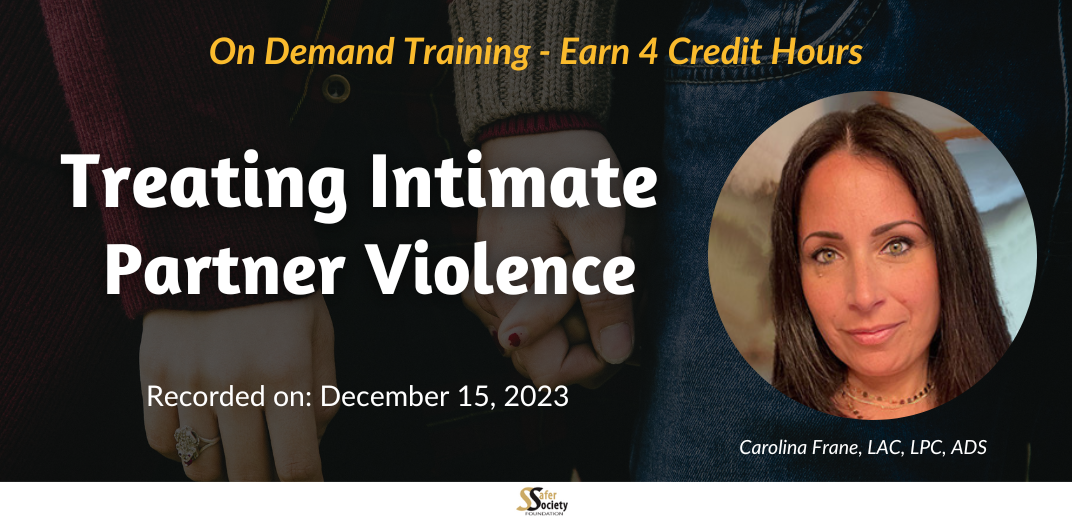
Treating Intimate Partner Violence
Already purchased an On Demand training?
Click here to access your Safer Society On-Demand Training Center account.
People who commit intimate partner violence (IPV) are different from others who cause harm. Their treatment requires understanding of what is unique about IPV as well as special sensitivity to those who have been victimized by it. Without proper training and knowledge, clinicians can do unintended harm to victims by, for example, viewing IPV as a relationship issue or couple’s problem. In actuality, IPV offenders also commit other crimes and often present with co-occurring disorders, each of which need to be addressed for successful treatment.
This training looks at important considerations when working with clients who perpetrate IPV while ensuring the safety of those suffering the abuse. The session will explore the definitions and dynamics of IPV and domestic violence and review the guiding principles of effective intervention. It provides prevalence statistics and dispels myths about IPV. Treatment approaches will be introduced, intended to end the harmful behavior, but always with the goal of applying measures that will protect the victim from further harm.
Topics covered include:
- Defining Intimate Partner Violence and Domestic Violence
- Development of IPV in relationships
- Types of IPV
- Principles to assess appropriate treatment dosage based on risk and needs
- Tools for IPV treatment
1) Define what IPV is, and what it is not.
2) Use principles that help individualize evaluation and treatment, in order to best treat the IPV population.
3) Explain IPV cycles and types.
4) Develop healthy relationship goals for work with IPV clients.
5) Use resources that will help move forward in gaining support to work with the IPV population.
Audience
The audience for this training includes professionals working with individuals who perpetrate intimate partner violence (IPV) and those aiming to ensure the safety of IPV victims. That includes social workers, counselors, and other mental health professionals, as well as healthcare providers and IPV advocates and specialists.
Content Level
Disclosure
Continuing Education Approval
American Psychological Association (APA)
Safer Society Foundation, Inc. is approved by the American Psychological Association (APA) to sponsor continuing education for psychologists. Safer Society Foundation, Inc. maintains responsibility for this program and its content.
Who's Presenting

Carolina Frane, LAC, LPC, ADS
Carolina (pronounced “Caroleena”) Frane is licensed in Colorado as a Licensed Professional Counselor (LPC), a Licensed Addiction Counselor (LAC), and is certified as an Acudetox Specialist. She has worked in the field of domestic violence for 19 years. She has worked as a Treatment Provider, Clinical Supervisor, and is a trainer for new clinicians who are seeking approval to work as Domestic Violence Offender Management Board (DVOMB) Approved Providers. In her current role as staff to the DVOMB, she provides technical assistance and implementation of the Colorado State Standards. She is approved as a Correctional Fatigue to Fulfillment (CF2F) trainer and delivers national and international training and conference presentations in domestic violence and intimate partner violence topics. She is an avid advocate for promoting safety for those who have been victimized and opportunities for growth and healing in those who perpetrate IPV.
